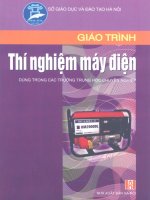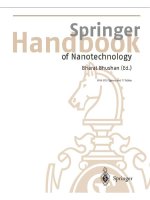English Grammar Course - part 1 potx
Bạn đang xem bản rút gọn của tài liệu. Xem và tải ngay bản đầy đủ của tài liệu tại đây (305.81 KB, 54 trang )
E_English Grammar Course
Chapter I
Elements of grammar
Issues
1. Introduction to Grammar
2. Morphemes and Words
3. Ways of word formation
4. Parts of speech
5. Parts of a sentence
6. Types of phrases, clauses, sentences
Introduction to Grammar
Grammar
Grammar
In global sense
In global sense
In narrow sense
In narrow sense
1
1/1
Introduction to Grammar
Grammar
Grammar
In global sense
In global sense
In narrow sense
In narrow sense
•
equals competence, a body of knowledge that a
native speaker has about his/her language which
enables him/her to speak and understand it.
•
includes word and sentence structure rules,
pronunciation rules, meaning of words/ sentences,
and discourse organization rules.
•
equals competence, a body of knowledge that a
native speaker has about his/her language which
enables him/her to speak and understand it.
•
includes word and sentence structure rules,
pronunciation rules, meaning of words/ sentences,
and discourse organization rules.
1
2/1
Introduction to Grammar
Grammar
Grammar
In global sense
In global sense
In narrow sense
In narrow sense
•
refers only to the formation of the word and sentence
structures.
•
consists of morphology, the study of words and word
formation, and syntax, the study of phrases, clauses,
and sentences.
•
refers only to the formation of the word and sentence
structures.
•
consists of morphology, the study of words and word
formation, and syntax, the study of phrases, clauses,
and sentences.
1
3/1
Morphemes and Words
discourse
sentence
phrase
word
morpheme
2
1/2
Morphemes and Words
discourse
sentence
phrase
word
morpheme
I actually felt tired of
sitting doing nothing.
And I hated enjoying
the unemployment
benefit. I found myself
useless. Then I decided
to look for a job.
I found
myself
useless.
hated
enjoying
hated,
enjoying
enjoy,
-ing
2
2/2
Lexical item – meaning
LEXICAL ITEM
LEXICAL ITEM
= A basic unit of meaning …
•
A single word
(E.g.: man, boy)
•
Less than a word
(E.g.: terr in terror)
•
More than one word
(E.g.: to rain dogs and cats)
2
3/2
Lexical item – meaning
LEXICAL ITEM
LEXICAL ITEM
MEANING
MEANING
&
Lexical item and meaning has arbitrary relationship.
2
4/2
Morpheme - Word
MORPHEME
MORPHEME
= A minimal meaningful unit
E.g.: re/try
boy/s
5/2
2
Morpheme - Word
WORD
WORD
= An independent meaningful unit.
E.g.: try
boy
turn
return
2
6/2
Occurrence
Types
Free
(words)
Bound
(affixes)
Grammatical Function words:
prepositions, pronouns,
conjunctions
inflectional
(suffixes)
Lexical Content words:
Nouns, verbs, adverbs,
adjectives
derivational
(prefixes, suffixes)
Types of morphemes
2
7/2
Inflectional morphemes Derivational morphemes
Inflectional vs. Derivational morphemes
modify the meaning of an
item but not change its parts
of speech.
can change meaning of the
stem and typically, they
change the part of speech.
2
8/2
Inflectional morphemes Derivational morphemes
Inflectional vs. Derivational morphemes
are changes in words to
express their semantic and
syntactic relationships to
other words in the sentence.
E.g.: ‘-s’ in ‘Bush says’
indicates the present tense
and the subject is third
person and singular.
indicate semantic
relationships within words.
E.g.: the morpheme ‘-ful’ in
‘beautiful’ has no connection
with other morphemes
beyond the word.
2
9/2
Inflectional morphemes Derivational morphemes
Inflectional vs. Derivational morphemes
are regularly distributed.
They occur with all or most
members of a word class.
E.g.: ‘-s’ (3rd person
singular present) occurs
with most verbs.
do not occur across whole
classes.
E.g.: not all verbs take the
derivational suffix ‘-al’ as
refuse, propose.
2
10/2
Inflectional morphemes Derivational morphemes
Inflectional vs. Derivational morphemes
typically occur away from
the root.
E.g.: the plural morpheme ‘-
s’ occurs at the end of a
word, after all other
morphemes.
occur close to the root,
before inflectional
morphemes.
E.g.: organizations.
2
11/2
Inflectional morphemes Derivational morphemes
Inflectional vs. Derivational morphemes
-s: 3rd person singular
present
-ed: past tense
-ing: present participle
-en: past participle
-s: Plural
-s: possessive
-er: comparative
-est: superlative
There are a large number of
derivational morphemes,
which can be prefixes or
suffixes.
2
12/2
Inflectional vs. Derivational morphemes
•
Work in groups of 3
•
Each group make a list of 5 inflectional
and 5 derivational morphemes
•
What are their meanings?
•
The fastest group win the game
2
13/2
Prefixation:
Prefixation:
adding a prefix to the base
E.g.: Non-stop
Predict
Morphological processes of word
formation
1/3
3
Suffixation:
Suffixation:
adding a suffix to the base
E.g.: Economist
Grammatical
Morphological processes of word
formation
2/3
3
Conversion:
Conversion:
a change of word-classes
without affix.
E.g.: Import (n), (v)
Abstract (n), (adj)
Morphological processes of word
formation
3/3
3
Compounding:
Compounding:
word formation from two or
more bases.
E.g. Greenhouse effect
Desktop computer
Morphological processes of word
formation
4/3
3
Clipping:
Clipping:
shortening a word
E.g.: Phone from telephone
Photo from photograph
Flu from influenza
Morphological processes of word
formation
5/3
3
Reduplication:
Reduplication:
word formation from two or
more either identical or slightly
different elements.
E.g.: Goody-goody
Tick-tock
Seesaw
Wishy-washy
Tip-top
Morphological processes of word
formation
6/3
3
Blending:
Blending:
word formation from two
separate forms.
E.g.: Motel from motor and hotel
Smog from smoke and fog.
Morphological processes of word
formation
7/3
3









